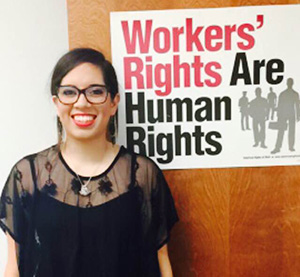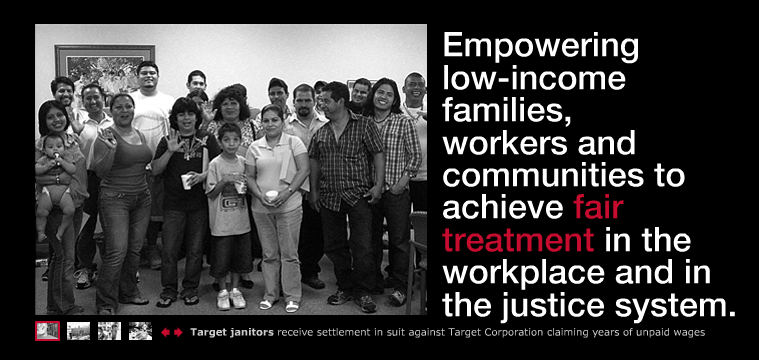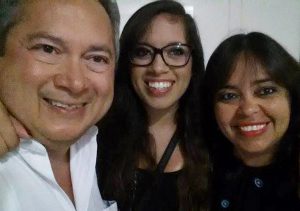Valentina Gudiño is an anthropology and international relations & global studies senior who was born in Cabimas, Venezuela and grew up in Houston, Texas. This semester, she’s working 10 hours per week as an intern at the Equal Justice Center.
Monica Chartier, programs manager for Liberal Arts Career Services, says roughly one third of students who utilize career services express interest in pursuing nonprofit work. Many of those students gain experience volunteering or interning with nonprofit organizations and can transition into employment roles after graduation.
“Nonprofits tend to be mission and purpose driven and are highly motivated by social change,” Chartier says. “Employment in the nonprofit sector gives liberal arts majors the opportunity to directly impact social movements that are important to them as professionals in the field.
“Also, nonprofits frequently prefer to hire individuals who have a wider range of skills and can wear multiple ‘hats’ for the organization,” Chartier continued. “Our students’ versatile abilities in critical thinking, communication, systems thinking and relating to and understanding people makes them ideal candidates for nonprofit work.”
Students and alumni interested in finding a job or internship with a nonprofit can attend UT Austin’s Nonprofit & Government Career Fair in the Texas Union Ballroom on April 8. The event takes place from 11 a.m. to 3 p.m. To learn more, click here.
Read more about Gudiño and her work with the EJC in the Q&A below.

How did you first find out about the Equal Justice Center?
I used to be a member of the International Affairs Society, and they would have speakers come in during meetings who had “worldly” related jobs, research, etc. Then I went to the career fair in fall of 2014, and I recognized the name and signed up for an interview to be an intern.
What does the EJC do?
The Equal Justice Center is a nonprofit law firm that empowers low-income families and communities in the workplace and legal system. The lawyers at the firm provide legal representation that enables working-class men and women to recover unpaid wages and fight against injustice in the workplace despite their immigration status. EJC also works for systematic reform that strengthens employment rights and expands access to the justice system to everyone who is being exploited.
What made you want to intern there?
I’ve always been interested in activist work and helping others, so when I heard about so much injustice happening so close to home I thought I could do something to help these people. I am a Latin American studies minor, and I have always been interested in the inequalities the people in Latin America face, but I never truly understood how this gets transferred to the U.S. You don’t really imagine people being exploited for their labor and cheated of their money at the restaurants that we eat in every day, and we tend to ignore the injustices faced by the construction workers who allow us to live in our luxurious West Campus housing.
What is your role at the Equal Justice Center? What’s an average week like?
I am an intake intern, which consists of working with our list of callers who are potential clients. I am on the phone, calling people back who are encountering problems at their jobs. I fill in an initial intake form with them, which I later review with the lawyers in the office. About once every two weeks I have a meeting with the lawyers in which they review all the intakes I have done, and they provide me with referral information for the cases we cannot take or follow-up questions for the potentially viable cases. I call back the potential clients I spoke to initially and either provide them with referral guidance, or ask them further questions needed in order to pursue a case against a company.

What advice would you give to other students interested in getting involved with a nonprofit?
I love working for the Equal Justice Center. However, sometimes it takes a toll on me because I wish we could help everyone, but as a small nonprofit we have to turn people away who don’t have a chance of winning a case. We have so many callers and so many people who are exploited and abused in our work system, and not everyone gets the success story with the check in the end. I would just advise students to not get too emotional when it comes to helping others. To maximize the amount of people we help, I have learned that I can’t get torn over the people we can’t, I just have to hope that our referral advice helps them and they get justice in one way or another.
How has your liberal arts education impacted you? Did it have an influence on your decision to intern for a nonprofit?
As an IRG major I have learned a lot about nonprofits, such as the negative and positive sides of their impact on specific communities. Even though I have realized that not all aid is helpful to certain communities, I believe that in places like the U.S. they are necessary because some individuals who aren’t considered part of our civil society seem to fall through the cracks of our justice system. If the U.S. is the land of the free and a representation of democracy to the world, I think that nonprofit organizations that protect these values of freedom and equal rights are absolutely necessary in our society.
IRG definitely did influence my decision to work for nonprofits, and anthropology inspired me to look into activist work and to explore the stories of the communities that live in the margins of society. The Equal Justice Center is a good mixture of both.

Do you know what you want to do after graduation? Has this internship influenced your decision?
I am really torn about whether I want continue working for nonprofit and activist organizations, or if I want to start looking at graduate programs right away. I have a lot of hard decisions to make really soon, but as of now I want to save money because I want to go backpacking across Latin America.
If I do go to graduate school, I want to study Latin American studies. UT has an amazing program, but I want to explore the subject completely. I know it’s unlikely that I will be able to study every Latin American culture, but I do want to see more of what fascinated me as a child in Venezuela. I believe this internship has served as a stepping stone to future activist work, but just a little closer to home.
The Equal Justice Center is currently looking for new interns. Click here to learn more.
